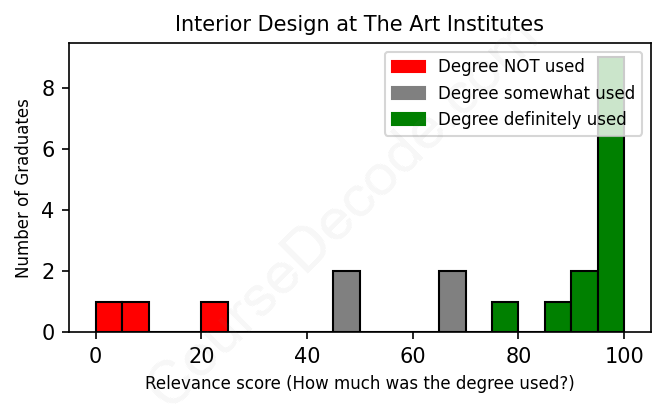
First, some facts. Of the Interior Design graduates from The Art Institutes we've analyzed , here's how many have used (or NOT used) their degree in their career:

These are estimates based on AI analysis of 20 LinkedIn profiles (see below).
The verdict? Above average. Overall, with an average relevance score of 74%, Interior Design graduates from The Art Institutes have a higher likelihood (+7%) of finding work in this field compared to the average graduate across all fields:
And for comparison, here's the chart for all profiles we've looked at across all degrees.
Also, after graduating, only 5% of these graduates have pursued further education other than another Bachelor's degree (such as a Masters degree or other), compared to the average across all profiles of 35%. This suggests a Bachelors degree is enough for most Interior Design graduates, and it's normal to look for work straight after graduation.
See the details:
|
Relevance score: 89% We think this person has gone into a career highly relevant to their degree. We think this person has gone into a career highly relevant to their degree.
DEGREE INFOGraduated in 2012 from The Art Institutes with a Bachelor of Science in Interior Design in Interior Design. No other secondary education since. JOB HISTORY SINCE GRADUATIONSales and Design Consultant The Tile Shop Jun 2012 - Apr 2014 Sales and Design Consultant  Arhaus Apr 2014 - Feb 2015 Interior Designer  HomeTech Renovations Inc. Feb 2015 - Present ABOUTDesign is something that I have always been interested in, even at a young age I was space planning and redesigning my home. I am very passionate about designing a space that is not only beautiful but most importantly functional. What I enjoy the most is problem solving and making even the smallest spaces special. I admire the craftsmanship and beauty of antiques and love to incorporate unique elements into my designs.Studied at the Art Institute of Philadelphia (CIDA accredited), earning a Bachelors of Science in Interior Design. At AIPH I received several awards for my work including Best of Class for Furniture Design and Construction, and Residential Row Home Design. I also received an Honorable mention for my Welcome Center design for the Annual Kling Stubbins Design Competition. I have three years experience as a design and sales consultant, specializing in tile, stone, and home furnishings. I am also a member of the National Kitchen and Bath Association (NKBA) and in the process of getting my AKBD Certification. |
The top 10 most common jobs done by the graduates we've analyzed (ranked most common to least) are:
When looking at the career paths of graduates from The Art Institutes who studied Interior Design, it’s interesting to see a mixed bag of job roles, some that align really well with their degree and others that don’t quite hit the mark. A significant number of graduates end up in positions like Interior Designer, Design Consultant, or Visual Merchandising roles where they can apply the design principles taught in their programs. For example, many have taken on roles that involve direct involvement in creating and managing interior spaces, like Interior Designers at companies such as HomeTech Renovations or SCENE ONE INTERIORS. These experiences are definitely relevant and utilize the core skills and knowledge gained in their studies.
However, not all graduates have pursued careers directly tied to interior design. Several ended up in sales, product support, or unrelated positions like accounting, which don’t require specialized interior design knowledge. Roles like Sales Associate at Pottery Barn or Accounting Technician III don’t really tap into the skills they learned during their degree. It’s a bit of a rollercoaster – while many graduates find fulfilling work in their field, there’s a fair share who drift off into jobs that don’t make the most of their education in Interior Design. So, it seems that while there are solid placements related to the field, there’s still a notable number of people whose jobs fall outside that design-specific realm.
Here is a visual representation of the most common words in job titles for Interior Design graduates (this is across all Interior Design graduates we've analyzed, not just those who went to The Art Institutes):

From what I gathered by looking at the LinkedIn profiles of graduates from The Art Institutes with degrees in Interior Design, it seems like they have pretty diverse career trajectories, especially in their early years after graduation. Many of them start off with internships or entry-level positions, like design assistants or CAD draftsmen. A common theme is that people often jump into roles that blend design with sales or visual merchandising, which can be great for gaining real-world experience and building a portfolio. Over the first few years, some graduates do land positions that are more closely aligned with interior design, such as interior designers or project managers, showing that there is a pathway for advancement in the field.
Fast forward about five to ten years after graduation, and you can see a mix of outcomes. While some have taken on solid roles as interior designers or project managers, others have moved into areas that are a bit more tangential to interior design, like sales or teaching. A significant portion has also established themselves as freelancers or opened their own design firms, which is super cool and shows entrepreneurial spirit. However, there are also quite a few who seem to have found their way into unrelated fields, which raises some questions about job satisfaction and career fulfillment. Overall, it does look like there's potential for a decent career in interior design if graduates stay focused, but it's also clear that the job market can be unpredictable, leading some to veer off path after a few years. So, if you're thinking about going into this field, it's a mixed bag but definitely worth considering if you’re passionate about design!
Honestly, getting a Bachelor’s degree in Interior Design at The Art Institutes can be a mixed bag. On one hand, if you have a passion for design and a keen eye for detail, it can be super enjoyable and maybe even feel a bit easier because you’re doing what you love. You’ll pick up skills in things like color theory, space planning, and materials, which can be a blast if that’s your jam. However, be prepared for some serious projects and critique sessions that can get pretty intense. Overall, it’s not a walk in the park, but if you're motivated and willing to work hard, it can be a rewarding experience!
Most commonly, in the LinkedIn profiles we've looked at, it takes people 3 years to finish a Bachelor degree in Interior Design.
Looking at these Interior Design graduates from The Art Institutes, it seems like they've had a pretty solid mix of job experiences, but overall, their earnings might be a bit varied. Some of them, especially those who moved into managerial roles or started their own firms, likely made decent money—like the Visual Merchandising Manager and the Executive Vice President who both have solid positions. However, there are also quite a few who bounced around between internships and more entry-level roles, like the CAD Draftsman or the Sales Associate positions, which won't pay as well. It seems like those who’ve stayed focused on high-level design or management have the best chance of raking in a good salary, while others might be still climbing the ladder. So, if you’re thinking about pursuing a career in interior design, it's definitely possible to earn well, but it looks like it requires a bit of hustle and maybe some luck along the way!
Here is a visual representation of the most common words seen in the "about" section of LinkedIn profiles who have a Bachelor degree in Interior Design (this is across all Interior Design graduates we've analyzed, not just those who went to The Art Institutes). This may or may not be useful:

Here are all colleges offering a Bachelor degree in Interior Design (ordered by the average relevance score of their Interior Design graduates, best to worst) where we have analyzed at least 10 of their graduates:
| College | Score | Count |
|---|---|---|
 Fashion Institute of Technology Fashion Institute of Technology
|
93 | 12 |
 University of Nebraska-Lincoln University of Nebraska-Lincoln
|
92 | 16 |
 Kent State University Kent State University
|
90 | 13 |
 Savannah College of Art and Design Savannah College of Art and Design
|
89 | 21 |
 Design Institute of San Diego Design Institute of San Diego
|
89 | 10 |
 Iowa State University Iowa State University
|
86 | 13 |
 Pratt Institute Pratt Institute
|
83 | 11 |
 Cazenovia College Cazenovia College
|
79 | 15 |
 Purdue University Purdue University
|
74 | 11 |
 The Art Institutes The Art Institutes
|
74 | 20 |
 San Francisco State University San Francisco State University
|
73 | 10 |
 East Carolina University East Carolina University
|
70 | 10 |
 Harrington College of Design Harrington College of Design
|
70 | 14 |
 Texas State University Texas State University
|
67 | 11 |
 Radford University Radford University
|
47 | 10 |